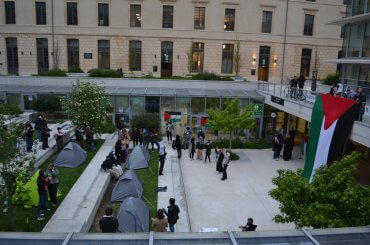June 18, 2012
Commissioners
220th General Assembly
Presbyterian Church (U.S.A.)
RE: Divesting from Caterpillar, Inc., Motorola Solutions, and Hewlett Packard
Dear Commissioners:
I wish you all well from the Holy Land and hope you have a fruitful 220th General Assembly.
I write you wearing two hats, that of an Ohio-born and educated American, and that of a Palestinian businessman who relocated with his family to his father’s birthplace, Al-Bireh/Ramallah, after the 1993 Oslo Peace Accords and who has lived under Israeli military occupation ever since.
It has been brought to my attention that the Church has come under extreme pressure from the Israel lobby to invest in Palestine rather than to divest from American companies that are profiting from the violent Israeli military occupation of Palestinians. As a Palestinian businessman, I urge you to resist that pressure.
It is sadly ironic that this Israel lobby is now enthusiastically interested in supporting the Palestinian economy. This is the same lobby whose officials have been indicted for espionage against theU.S., and the same lobby that has, over the last decades, facilitated the flow of arms to Israel and funding to the Israeli settlement enterprise.
This flow of U.S. arms to Israel was noted in Amnesty International’s February 20, 2009 report when they “called on the UN to impose a comprehensive arms embargo on the parties to the conflict.” Arms are only part of the picture. The other part of the picture is the complementary products and services provided by many multi-national firms, including the ones you are considering divesting from today.
I came to Ramallah to help Palestinians build their nation and was one of two persons who founded the operations of the largest Palestinian private sector firm, the Palestine Telecommunications Company (PALTEL). As a result, I quickly discovered the control the Israeli military occupation has over every aspect of the lives of the Palestinian people living under occupation.
Without exaggeration, the Israeli military, directed by the Israeli government, micro-manages every aspect of the Palestinian economy. That micro-management applies to the telecommunications sector as much as it applies to the newly-created private equity funds. Over the years, I’ve explained this phenomenon in numerous op-eds in publications such as The New York Times, The Guardian, and the Israeli English language newspaper Ha’aretz. Many times I have co-authored writings with Israeli friends who are part of the growing number of Israelis who recognize that the extremely polished bluff of establishing “economic peace” is not just unrealistic for people living under military occupation, but also impossible.
Some will argue that one should invest in Palestine instead of divesting from Israel. Divestment, they claim, is so negative. Nothing could be further from the truth. Divestment is a highly mature, time-tested, non-violent method to resist injustices by states. Furthermore, investment in Palestine is a no-brainier and should be pursued regardless of the divestment campaign. That said, I work in the private sector in Palestine, and personally know most, if not all, of the people behind the investments and equity funds. They will all agree with me when I say the Israeli occupation is making it nearly impossible to have and maintain serious, sustainable investment in Palestine.
Even the World Bank has acknowledged that Palestinian economic “growth has been unsustainable, driven primarily by donor aid rather than a rebounding private sector, which remains stifled by Israeli restrictions on access to natural resources and markets.” (Sustaining Achievements In Palestinian Institution-Building And Economic Growth, World Bank, September 18, 2011.)
In a perfected Orwellian move, pro-Israeli lobbyists publicly promote investment in Palestine, but simultaneously turn a blind eye to the systematic Israeli polices that strangle the Palestinian economy. Investment in Palestine—without divestment from the Israeli occupation—only continues to underwrite the status quo of military occupation. The pro-Israeli lobbyists who believe otherwise are those who accept the slogans of Israeli state propaganda, but refuse to scratch the surface to reveal the reality of occupation on the lives of Palestinians.
The Church has always talked the talk of peace and justice; now is the time for the Church to take substantive action and walk the walk of non-violent action to hold those who profit from the occupation accountable.
Caterpillar bulldozers raze Palestinian homes; Motorola Solutions provides surveillance on the grounds of settlements deemed illegal by international law; Hewlett Packard provides the tracking system that controls all movement of Palestinians at the checkpoints throughout the West Bank. These companies are clearly profiting from the occupation, and have a vested interest in sustaining the situation. Without this information, communities of conscience are unknowingly rewarding multi-national companies for their ability to profit from human rights violations.
Palestinian civil society and Palestinians—Christians and Muslims alike—have urged you to divest from the occupation. As we struggle to remain hopeful while a 24-foot high cement wall snakes through our homeland, we Palestinians don’t want a more beautiful prison to live in. We want the prison walls to come down, and that won’t happen unless pressure is placed on Israel to end the occupation.
Your decision to divest from Caterpillar Inc., Motorola Solutions, and Hewlett Packard would be an act of solidarity with Palestinians and Israelis who non-violently oppose the occupation, and a sign of hope to a people who have already suffered too much for too long.
Again, I wish you a successful General Assembly and, whatever the outcome, you are always welcome in Palestine.
Sincerely,
Sam Bahour


That’s what the EU and the US have been doing all along.
They invest in Palestine (A few measly millions of dollars) while continuing to shower Israel with money (Billions of dollars).
So the Presbyterian church is following in the footsteps of the world’s biggest hypocrites.
Good job.
I’m sure god is pleased with your decision.
RE: “[Bahour] Letter to Presbyterians: Investing in Palestine without divesting from occupation only underwrites the status quo”
ILAN PAPPE: “. . . [T]here is really no other alternative [to the BDS campaign against Israel]. Any other option. . . is a willful decision to be an accomplice to crimes against humanity.”
SEE: “Ilan Pappé: the boycott will work, an Israeli perspective” ~ Ceasefire Magazine, 6/16/12
ENTIRE COMMENTARY – http://ceasefiremagazine.co.uk/ilan-pappe-boycott-work-israeli-perspective/